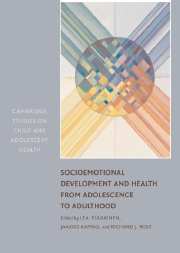Book contents
- Frontmatter
- Contents
- List of Contributors
- Preface
- Introduction
- PART I LONGITUDINAL AND BEHAVIORAL GENETIC APPROACHES
- PART II ADOLESCENT HEALTH-RELATED BEHAVIOR AND ADULT HEALTH
- PART III SOCIOEMOTIONAL BEHAVIOR IN EARLY ADOLESCENCE
- 8 Genetic and Environmental Factors in Girls' and Boys' Socioemotional Behavior
- 9 Emotion Regulation and Well-Being
- 10 Parental Knowledge and Family Atmosphere in Relation to Children's Socioemotional Behavior
- 11 Parental Work and Children's Behavior: The Mediator Roles of Partner Relationship and Parenthood
- 12 Grandparents as Resource Factors in the Family
- PART IV LIFE COURSE AND HEALTH
- Summary and Future Directions
- References
- Author Index
- Subject Index
11 - Parental Work and Children's Behavior: The Mediator Roles of Partner Relationship and Parenthood
Published online by Cambridge University Press: 07 December 2009
- Frontmatter
- Contents
- List of Contributors
- Preface
- Introduction
- PART I LONGITUDINAL AND BEHAVIORAL GENETIC APPROACHES
- PART II ADOLESCENT HEALTH-RELATED BEHAVIOR AND ADULT HEALTH
- PART III SOCIOEMOTIONAL BEHAVIOR IN EARLY ADOLESCENCE
- 8 Genetic and Environmental Factors in Girls' and Boys' Socioemotional Behavior
- 9 Emotion Regulation and Well-Being
- 10 Parental Knowledge and Family Atmosphere in Relation to Children's Socioemotional Behavior
- 11 Parental Work and Children's Behavior: The Mediator Roles of Partner Relationship and Parenthood
- 12 Grandparents as Resource Factors in the Family
- PART IV LIFE COURSE AND HEALTH
- Summary and Future Directions
- References
- Author Index
- Subject Index
Summary
INTRODUCTION
Research on the relation between work and family has demonstrated that an individual's experiences at work can have far-reaching effects, affecting not only the individuals themselves but other family members as well (see e.g., Perry-Jenkins, Repetti, & Crouter, 2000, for a review). In this chapter, we focus on the children's perspective by trying to shed light on the question of how mothers' or fathers' employment affects their children's well-being. This type of research started by looking for direct effects of parental – and especially maternal – employment on children's development. The empirical question was whether maternal employment was detrimental to children and it was reduced to the direct comparisons of the children of employed and nonemployed mothers, usually without examination of parenting. The results, however, have shown that employment per se is neither facilitative nor detrimental to children's development (see Gottfried, Gottfried, & Bathurst, 2002).
In the 1980s Bronfenbrenner and Crouter (1982) called for researchers to move beyond the traditional deprivation approach, which equates employment with a linear measure of maternal absence from the child, and to focus instead on the quality of work. In addition, attention was shifted from direct effects to indirect effects: A mediational viewpoint was emphasized. Mediation continues to be the trend of current research. This line of research tries to capture the processes that intervene between parental work (involving work instablity, unemployment, and quality of work) and children's behavior and well-being.
- Type
- Chapter
- Information
- Publisher: Cambridge University PressPrint publication year: 2006



